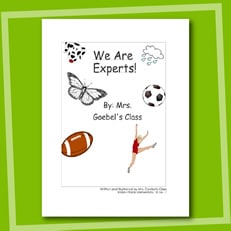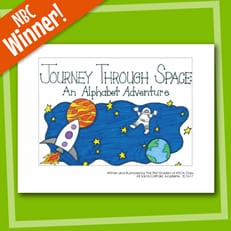 Tell your students you’re going to practice “informational writing,” and you’re likely to be greeted with a chorus of yawns. But tell them they’re going to play research detective and go digging up secret knowledge about a topic they love, and nine times out of ten, you’ll see their faces light up.
Tell your students you’re going to practice “informational writing,” and you’re likely to be greeted with a chorus of yawns. But tell them they’re going to play research detective and go digging up secret knowledge about a topic they love, and nine times out of ten, you’ll see their faces light up.
If you’re wondering how to teach informational writing to your 2nd graders without fear of boredom, the secret lies in playing to their strengths—namely, the trademark boundless creative energy and inquisitiveness of youth.
 Tip #1: Choose a Topic That Sparks Their Curiosity
Tip #1: Choose a Topic That Sparks Their Curiosity
 Researching a dry topic that lacks appeal is a drag for writers of any age. One of the best ways to keep your students engaged and motivated to write while teaching informational writing skills is to take care to choose a topic that they’ll be enthused to explore.
Researching a dry topic that lacks appeal is a drag for writers of any age. One of the best ways to keep your students engaged and motivated to write while teaching informational writing skills is to take care to choose a topic that they’ll be enthused to explore.
A topic which leaves room for a variety of responses—such as asking each student to write about a different deep-sea creature, or having them each pick a historical event they’d like to know more about—is one great way to let their interests help guide your lesson plan. Plus, both you and your students will get to learn about a wide range of specific subjects once it comes time to share work with the class! You may also want to include a personal element by asking them to choose a favorite subject from an overarching umbrella topic, or pick something directly relevant to their lives, such as writing about their pets.
PROJECT IDEA
Mrs. Goebel of Rollins Place Elementary did an amazing job of encouraging her class to pursue their curiosity and showcase their personal interests when she helped them publish this classbook project. We Are Experts! is a celebration of each students’ unique area of expertise, including holidays, technology, sports and even Pokemon!
We Are Experts! by Mrs. Goebel’s class
 Tip #2: Help Them Organize Their Thoughts
Tip #2: Help Them Organize Their Thoughts
 One of the more challenging aspects of teaching informational writing is helping your 2nd-grade students figure out how to process and filter their research. Now that they’ve got all of this information ready to go, what do they do with it? Providing your students with an informational writing graphic organizer gives them a visual guide for organizing both their thoughts and the basic layout of their responses. Framed paragraphs or paragraph hamburgers may also be helpful strategies for keeping your students on track, particularly during the early stages of introducing your students to informational writing.
One of the more challenging aspects of teaching informational writing is helping your 2nd-grade students figure out how to process and filter their research. Now that they’ve got all of this information ready to go, what do they do with it? Providing your students with an informational writing graphic organizer gives them a visual guide for organizing both their thoughts and the basic layout of their responses. Framed paragraphs or paragraph hamburgers may also be helpful strategies for keeping your students on track, particularly during the early stages of introducing your students to informational writing.
PROJECT IDEA
Our All About Animals Book, published by Mrs. Romero and Mrs. Szczurek’s class, is one colorful example of strategic writing at its finest. In addition to using framed paragraphs to dictate the structure of their entries, these students also included a detailed Table of Contents to further organize their classbook.
Our All About Animals Book by Mrs. Romero and Mrs. Szczurek’s class
 Tip #3: Encourage Them to Refine and Rewrite
Tip #3: Encourage Them to Refine and Rewrite
 The core of good informational writing is clarity. Being able to communicate their knowledge and ideas effectively is a valuable life skill for each of your students. Of course, even with a solid strategy in place, it can be all too easy to overlook minor errors or confusing statements in one’s own work. The best way to teach your students how to refine their informational writing skills is to employ a little peer editing and proofreading. Reviewing each other’s work (and revising their own) will help familiarize your 2nd-grade students with common mistakes and how to avoid them.
The core of good informational writing is clarity. Being able to communicate their knowledge and ideas effectively is a valuable life skill for each of your students. Of course, even with a solid strategy in place, it can be all too easy to overlook minor errors or confusing statements in one’s own work. The best way to teach your students how to refine their informational writing skills is to employ a little peer editing and proofreading. Reviewing each other’s work (and revising their own) will help familiarize your 2nd-grade students with common mistakes and how to avoid them.
PROJECT IDEA
Journey Through Space: An Alphabet Adventure, a charming classbook expertly published by the ASCA 1st graders of All Saints Catholic Academy, vibrantly illustrates the payoff of taking the time to revise, rewrite, and above all, practice, practice, practice. The students clearly put a lot of effort into their book—not just the writing itself, but their handwriting and even their illustrations—in order to make sure it was polished to perfection before hitting the printers. The result? A classbook they’ll be proud to have published for years to come.
Journey Through Space: An Alphabet Adventure by ASCA 1st graders of All Saints Catholic Academy
Sharing Your Students’ Informational Writing
When it comes to teaching your students about informational writing, the real pièce de résistance is helping them understand the value of knowledge—not only acquiring it, but sharing it. Teach your students to share this value by publishing their work for the world to see and enjoy. Who knows? Perhaps other students will learn a little something from their book—or even be inspired to find out more on their own!
For more free educational resources, including lesson plans, worksheets and more, head over to our online teacher’s lounge, and don’t forget to sign up for your free publishing kit!
Image sources: Lead image via Shutterstock; Images 1, 2, 3 via OpenClipart.org








